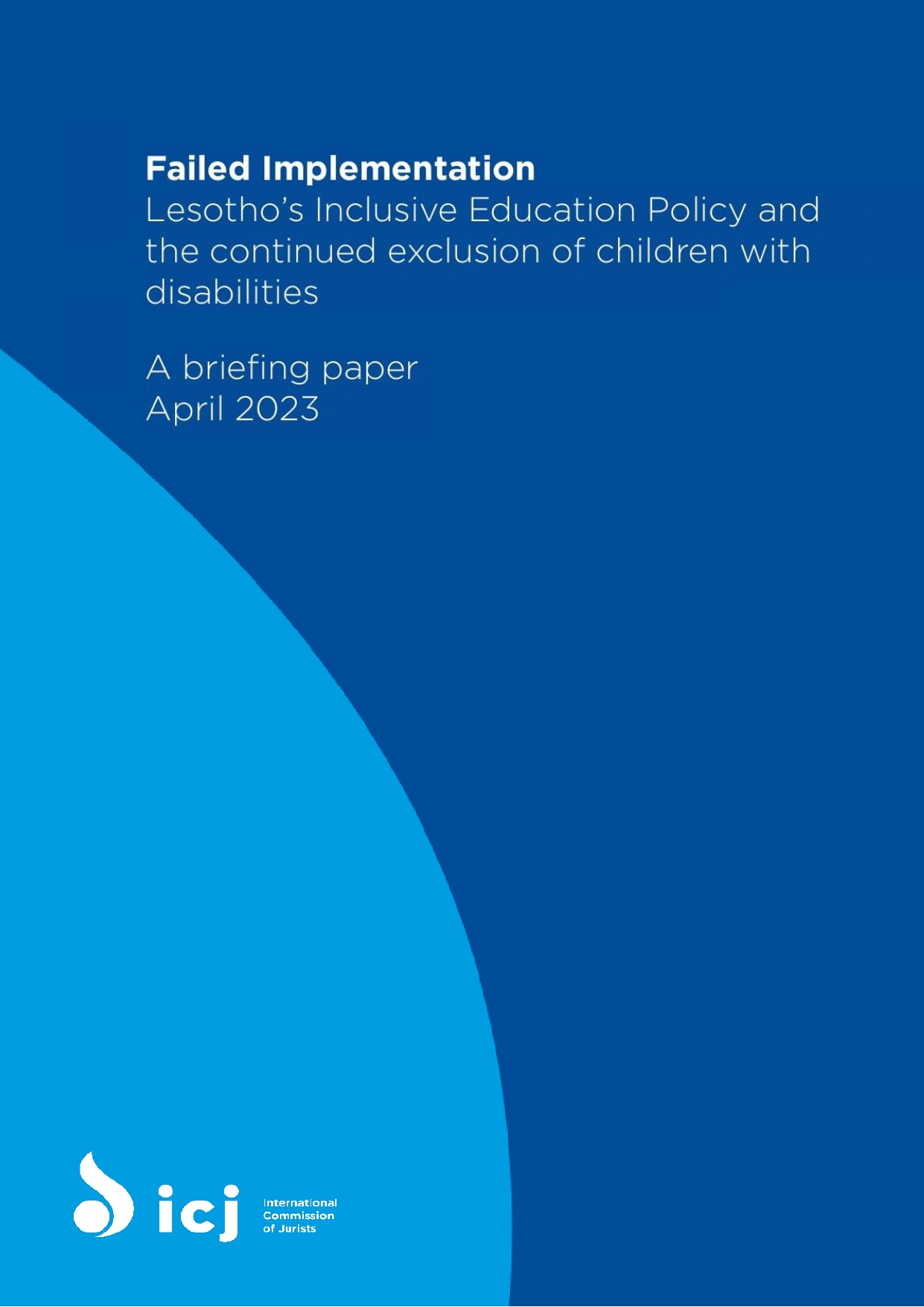The responsible Lesotho authorities have failed to ensure that learners with disabilities are able to enjoy their right to an education. This is because the country has not adequately adopted or implemented its laws and policies guaranteeing inclusive education. As a result many children with disabilities are not attending school at all, or are experiencing schooling which is not inclusive, equal or of adequate quality.
In a briefing paper published today entitled Failed Implementation: Lesotho’s Inclusive Education Policy and the continued exclusion of children with disabilities, the International Commission of Jurists (ICJ) has called on the authorities to take substantial, effective, and expeditious measures to address the significant challenges faced by children with disabilities in accessing education.
The ICJ stresses that despite taking some legislative and policy measures and acknowledging its obligations to provide inclusive education, Lesotho has not acted effectively to ensure that its education system has implemented these commitments. Failure to do so is a violation of its international human rights law obligations.
The briefing paper, which is informed by extensive research conducted during 2022 and 2023, is based primarily on interviews conducted by the ICJ with parents of children with disabilities, teachers and principals at schools accommodating children with disabilities, and interviews conducted with staff of the Ministry of Education and Training’s Special Education Unit.
“Every child has the right to attend school. A disability should not change this. Lesotho’s obligations in terms of the right to inclusive education require it to transform its education system to ensure that all children with disabilities can access equal, quality and accessible education.” said Tim Fish Hodgson, ICJ’s Legal Adviser on Economic, Social and Cultural Rights.
Such transformation is exactly what Lesotho’s Inclusive Education Policy, published in 2018, appears to contemplate in providing for inclusive education.
“Segregating children into special schools is unlikely to ever allow for inclusive education, and therefore international law requires that children with disabilities are afforded the opportunity to attend their regular, community schools along with their peers”, added Hodgson.
Despite Lesotho’s policy commitment many, like Mosa Kuape, a disability rights advocate, have been critical of the Lesotho government’s failure to take effective steps to implement this Policy.
“[The Lesotho government] are not implementing [their own policies]… They are just saying they are implementing. That is what I hate. The government just does not know how to implement, to be inclusive,” says Kuape.
Organizations such as the Lesotho National Federation of Organisations of the Disabled (LNFOD) and UNICEF Lesotho have provided various forms of support to the Ministry of Education and Training to try and bolster its ability to implement the policy.
“Many of the problems raised in the paper are well known to education ministry officials and staff at inclusive and special schools. Our research reveals a deep frustration in these environments with the lack of progress in implementing the Inclusive Education Policy.” said Mulesa Lumina, ICJ Legal and Communications Associate Officer.
The paper identifies a range of challenges to be overcome in order to achieve access to inclusive education for children with disabilities, including:
- Exclusion of children with disabilities from the significant majority of schools;
- Stigma and social exclusion persist both inside and outside schools;
- Funding is inadequate and inappropriate fees are levied on parents;
- Failure to implement core aspects of the Inclusive Education Policy;
- Failure to monitor the implementation of the Inclusive Education Policy;
- Key legislative gaps and inconsistencies persist, especially in regard to hostel/boarding facilities and private schools;
- Infrastructure at schools is unsafe and inaccessible;
- Learning materials are frequently inaccessible and access to them is limited;
- Both pre and in-service training of teachers are inadequate and insufficiently frequent.
The paper provides specific recommendations to the Lesotho authorities on how to remediate these deficiencies in line with domestic and international law.
Contact
Timothy Fish Hodgson, ICJ Legal Adviser on Economic, Social and Cultural Rights, timothy.hodgson(a)icj.org
Mulesa Lumina, ICJ Legal and Communications Associate Officer, mulesa.lumina(a)icj.org
Download
[Full Report] Lesotho Inclusive Education Briefing Paper (April 2023).
[Executive Summary] Lesotho Inclusive Education Briefing Paper (April 2023) – Executive Summary

